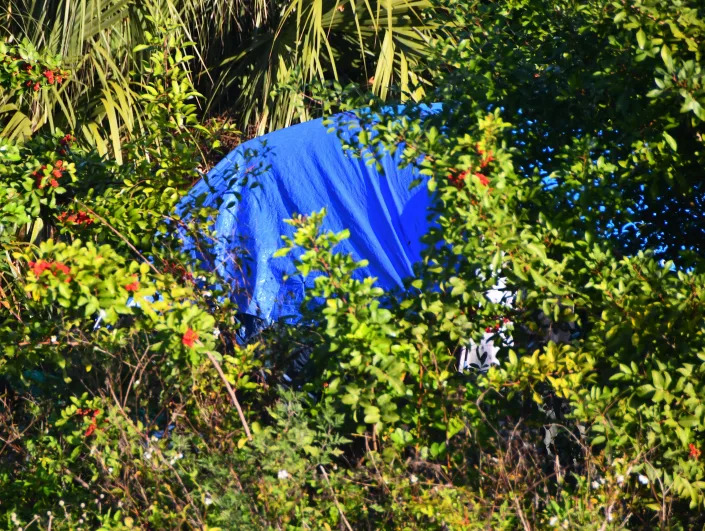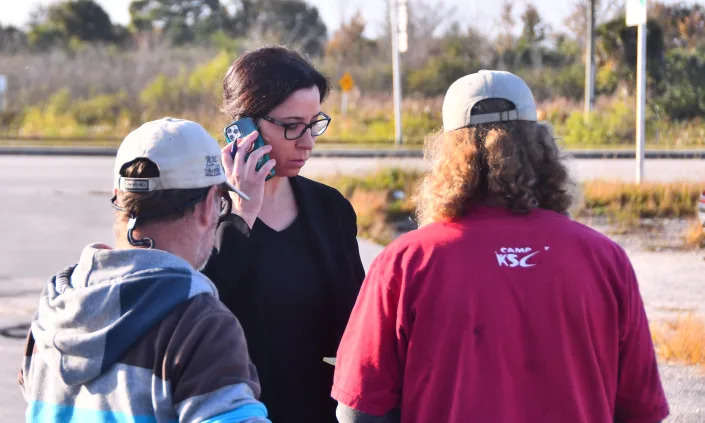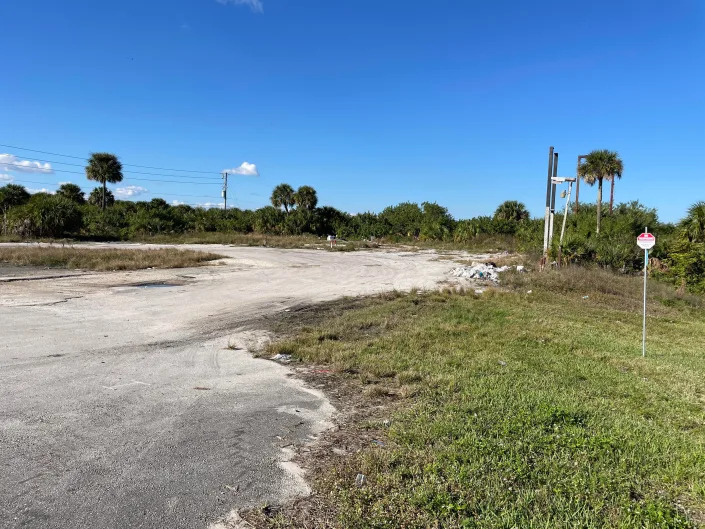https://news.yahoo.com/homeless-offenders-brevard-county-struggle-110207852.html
ason Kimbrough is sitting in Brevard County Jail waiting to appear before a judge on a charge of violating parole.
He’d rather be anywhere else, but the reality is he’s not wanted many other places.
A charge against him made in 1998 at 15 years old, of which he was convicted in 2000, has marked him as a sex offender. He is one of 735 registered sex offenders in Brevard County, according to statistics from the Florida Department of Law Enforcement.
That status makes Kimbrough something of a pariah.

Residents of a homeless camp off of 192 near Melbourne are facing a tough problem. They are being evicted from the property but the camp is their official address and can't leave the property or they will be violating their probation. Many wear ankle bracelets or have GPS monitors.
Housing is hard to come by, and the curfew he has because he's on parole after failing to register as a sex offender in 2017 means he has to return to the same spot every night, making it difficult to travel far to look for a home or work.
Since 2017, Kimbrough has called a Melbourne homeless camp home.
The Florida Department of Corrections registered his GPS monitor and ankle bracelet there. It was where he was required to return each night. But in early December, the camp was marked to be bulldozed by the property owner and he was charged with violating parole.
His jailing illustrates how tough it is for homeless sex offenders to reestablish themselves after serving their time.
"They never gave me an opportunity to live — to be able to be a productive member of society," he said. "Whether I'm a felon or whether I did what they say I did or not, I'm still human."
Limitations and restrictions
Despite numerous groups offering assistance to homeless people throughout Brevard County, those registered as sex offenders often are left out, according to advocates and offenders.
Limited housing options and restrictions preventing sex offenders from being within 1,000 feet of places where children might be present make it difficult for offenders.
Federal restrictions mean sex offenders are barred from getting federal housing assistance, and landlords at many private apartment complexes turn them away.
CITA, or Christ is the Answer Rescue Mission, is one of the few men’s shelters on the Space Coast. However, it has barred those on the sex offender registry from seeking emergency shelter.
"(This is) because of the playground/park across from us,” said Buddy Murrow, executive director of CITA.
He said he's not aware of any overnight shelters in Brevard County for men on the registry and that CITA typically refers offenders to two programs outside of the county.

Residents of a homeless camp off of 192 near Melbourne are facing a tough problem. They are being evicted from the property but the camp is their official address and can't leave the property or they will be violating their probation. Many wear ankle bracelets or have GPS monitors.
The South Brevard Sharing Center, a nonprofit organization that provides individuals with necessities like food, clothing, household items and help with rent and housing, welcomes any individual who needs support. But because of federal restrictions and limited funding, housing help for sex offenders is not provided, said Pamela Gunthorpe, the group's executive director.
“We don’t ask clients if they’re a sex offender. Somebody comes in and says that ‘they’re hungry, can they get a bag of food?’ OK, they can get a bag of food,” said Gunthorpe.
The South Brevard Sharing Center's housing resources come through the U.S. Department of Housing and Urban Development. Because of HUD restrictions, sex offenders cannot receive money, said Gunthorpe. She added that “if we have other (non-HUD funding) available, which we don’t currently, then we would work with the client to try to help them.”
Jeffrey Njus, the executive director of Daily Bread — a nonprofit providing food for the homeless and hungry — said the organization is part of the Brevard Housing Coalition, and they work to help sex offenders get off the street.
“(The housing voucher) is not available to people on the sex offender registry,” he said. “So we try to cobble together other resources or find places that are affordable that would also welcome a sex offender, and it’s very challenging.”
Njus said sex offenders and their charges are often viewed as “black and white,” and there often is no “gradation” between various offenses.
One offender he is working with — a woman with a “limited mental capacity” — was charged in her 20s, when she had a sexual relationship with a teenager, he said. Twenty years later, she’s married and facing a continuing battle to find housing due to her status.

Attorney Jessica J. Travis with DefendBrevard.com was out at a homeless camp early Wednesday Dec. 8, 2021, to help the people living in the camp who face being arrested if they leave. Residents of the homeless camp off of U.S. 192 near Melbourne are facing a tough problem. They are being evicted from the property but the camp is their official address, and they can't leave the property or they will be violating their probation or parole. Many wear ankle bracelets or have GPS monitors.
“She’s not a danger to the community,” Njus said. “And if we could have a way to find a remedy, it would help her move forward and benefit the whole community.”
Those on the registry must follow restrictions that state they must not live or at anytime be within 1,000 feet of schools, parks, playgrounds and daycares, with some exceptions if the offender was a minor when committing the offense, the school or daycare was opened after the offender established the location as their permanent residency or they established the area as their permanent residency prior to the ordinance, according to the Brevard County Sheriff’s Office.
"Basically what happens in the long run, is sex offenders just cycle in and out of custody because they have so many restrictions on (where they can live)," said Jessica Travis, an attorney with DefendBrevard.com. "It makes it very difficult for them to comply even when they're doing everything within their power to comply."
The homeless camp where Kimbrough lived was home to about eight registered sex offenders out of the approximately 14 people who lived there. Kimbrough told FLORIDA TODAY on Dec. 8 that the Sheriff’s Office had told them the day prior that if they didn’t leave the camp between 6 a.m. and 8 a.m. Dec. 8, they would face trespassing charges, as the property owner wanted it bulldozed.
Kimbrough said he planned to spend the day looking for a place to stay, then return to the camp for curfew. If he didn’t return, he would be charged with violating his parole.
At least seven campers were arrested on charges of violating their probation or parole even though they had remained at the camp, according to Travis.

Homeless people who set up camp at 4820 U.S. 192 near Melbourne were arrested Dec. 10. Since then, "no trespassing" signs have been put up around the property.
All had their first hearing about the criminal complaint at the Brevard County Jail Dec. 11, the day after they were charged.
Now, Kimbrough and the seven others are waiting to appear before the judge who initially granted them parole or probation. Some are slated in January and one in February.
According to the sheriff’s jail booking website, Kimbrough’s court date has not been set.
Research shows inconclusive recidivism rate
Are the restrictions facing sex offenders too stringent?
It depends who you ask.
One notable point: In Florida, once you’re on the sex offender registry, you’re there for life.
According to an FAQ on the Florida Department of Law Enforcement's website, the state has no method in its legal system by which someone who is registered as a sex offender can be removed from the registry.
Individuals registered as a lifetime sex offender are banned from admission to federally funded housing, according to the U.S. Department of Housing and Urban Development.
Not every state takes that approach.
For example, California adopted in January a three-tier registration system instead of a lifetime registration system. For adults, the tiers are 10 years, 20 years and life; for juveniles, it is 5 years and 10 years.
The research on sex offender recidivism varies greatly. A study conducted at the University of Nebraska at Omaha in 2013, found that registrants in Nebraska had a two-year sex crime recidivism rate of 1.7%. Other studies have found much higher rates.
A literature review of sexual offender recidivism rates by Lita Furby, Mark Weinrott and Lyn Blackshaw in 1989 published in the Psychological Bulletin and cited over 1,000 times on Google Scholar looked at at least 42 studies. It found that “because of the many practical difficulties of designing and conducting studies in this area, methodological shortcomings are present in virtually all studies, making the results from any single study both hard to interpret and inappropriate for the use of conventional confidence levels.”
When it comes to studying the recidivism rate among sex offenders, Furby et al. concluded that more time and resources are needed to be given to the topic to insure that study results are accurate.
In Kimbrough’s case, he was initially convicted in 2000. Since then, other than failing to register as a sex offender in 2017, he has faced other charges in Brevard County, though none of them have been related to sexual crimes.
Gail Colletta, president of Florida Action Committee — a nonprofit working to reform sex offender laws — said the vast majority of those on the registry are first-time offenders and do not offend again.
“If you keep (offending) over and over and over and over again, yes, there’s obviously something not connecting, and we certainly need to take a deeper dive and stronger look at that. But for most, that’s not the case,” Colletta said. “Something happened — there was a lapse, there was a mental health issue. It was alcoholism, there was drugs, there was dementia — and they acted out of character.”
Not everyone, though, thinks the restrictions are too much of a burden, and among the public, the sex offender registry has generally been popular. Residents can easily search databases that show where sex offenders live and get alerts sent to them if a sex offender moves in nearby.
Florida Rep. Randy Fine said groups sometimes come to him with concerns about child abuse and rape. They typically bring up topics such as background checks and the rights of “people who have been hurt,” he said.
Earlier this year, Fine sponsored HB 1189, which requires county health departments to participate in certified rape crisis centers’ sexual assault response teams, allows the establishment of these teams by the crisis centers, provides for duties and membership of sexual assault teams and more.
Fine said he imagines sex offenders run into the most issues with housing in terms of renting from private property owners.
“I own an apartment complex, and I do a background check, and I do a criminal check, and I go, ‘this isn’t the sort of person I want to live here,’” he said. “(I) guess it’s a good reason not to be a sex offender.”
Travis advocates for making more resources accessible to sex offenders.
"What keeps society safe is to have these guys in psychological treatment and to have them in a stable location where they can have hope, meaning that they can have jobs and they can be productive members of society again," Travis said. "Because when you put these guys in these no-win situations, anybody in that situation gets desperate and they're more difficult to monitor and keep a track on because then they start migrating off the grid, so to speak."

